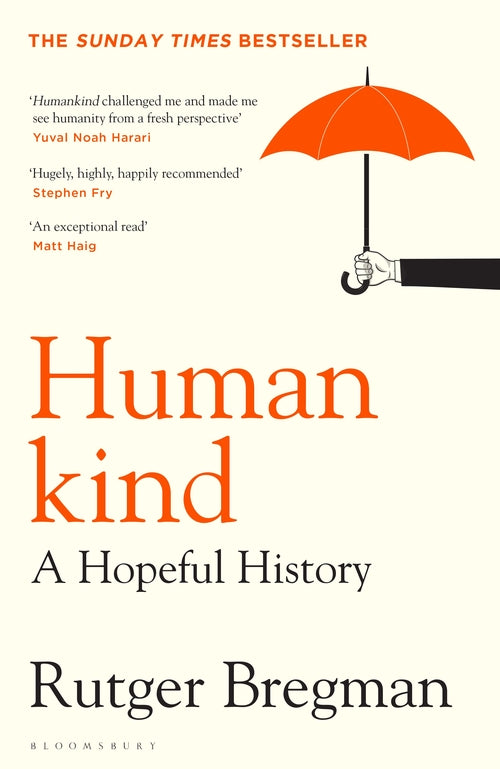Rutger Bregman
Humankind: A Hopeful History
Humankind: A Hopeful History
Couldn't load pickup availability
Leadership and Its Darkside: Insights from Rutger Bregman and Joe Aston
by Nick Day
* link to The Chairman's Lounge by Joe Aston
One of your good friends you work with has just been promoted to a position of seniority, such as Managing Director or Chair of a Board in corporate life. Initially, you think this is a fantastic opportunity and expect to be brought along for the ride. However, things don’t always go to plan. Your friend starts behaving differently, and the friendship breaks down: is it jealousy, the green-eyed monster? You either leave the job or stay on to observe further strange behaviour and decision-making. Is the shift in behaviour you observe merely your observation through green-tinged glasses, or is there something deeper at play?
In Humankind: A Hopeful History, Rutger Bregman challenges the belief that humans are inherently selfish, advocating instead for the concept of “survival of the friendliest.” Through historical and psychological analysis, as well as anecdotal evidence, Bregman posits that human nature is fundamentally kind and cooperative. By contrast, Joe Aston's The Chairman’s Lounge delves into the world of corporate power, providing a critical examination of the Australian business and political elite, particularly focused on Australia’s airline Qantas. Aston’s work serves as a cautionary tale about the excesses and ethical lapses that can accompany unchecked power.
Both authors acknowledge the work of Dacher Keltner and his book The Power Paradox, which reveals that people in power often display tendencies similar to those with brain damage. Aston goes to great lengths to note in his book that Alan Joyce was not a bad or ill-intentioned person; however, when challenged, he sometimes sounded crazy and was unable to comprehend just how irrational he seemed. Keltner observes that people under the influence of power become more impulsive, self-centred, reckless, arrogant, and less empathetic. Such individuals also frequently lack the ability to display that one facial expression unique to humans among primates: they don’t blush. A 2014 study by US neurologists found that the sense of power disrupts the mirroring neurons in our brain, a mental process key to empathy. This phenomenon makes powerful individuals feel disconnected from their fellow human beings, affecting their behaviour and decision-making.
Of course, the effects of power have societal as well as individual implications. Powerful individuals are more likely to view others negatively, believing that people need to be supervised, managed, and regulated. Conversely, those without power exhibit less confidence and constantly underestimate their own intelligence, leading to self-censorship. This dynamic has been evident throughout history, such as in Apartheid South Africa and Russia under Vladimir Putin. Lord Acton’s adage that “power tends to corrupt, and absolute power corrupts absolutely” resonates strongly through history, and Aston’s story is no exception. Despite these challenges, Bregman’s view that people are fundamentally good offers a glimmer of hope, even as Aston highlights the need for checks and balances to prevent the corrupting influence of power. Aston’s writing also appears to be part of the process and an important mirror to be held up to the powerful - like Alan Joyce. Perhaps Aston should use this paradox to hold more of these powerful people to account…the dark knight of the financial pages... or perhaps he already is ….
Both books are highly recommended.
Publisher's Review
An International Bestseller and A Guardian, Daily Telegraph, New Statesman and Daily Express Book of the Year.
'Hugely, highly and happily recommended' - Stephen Fry
'You should read Humankind. You'll learn a lot (I did) and you'll have good reason to feel better about the human race' - Tim Harford
'Made me see humanity from a fresh perspective' - Yuval Noah Harari
It's a belief that unites the left and right, psychologists and philosophers, writers and historians. It drives the headlines that surround us and the laws that touch our lives. From Machiavelli to Hobbes, Freud to Dawkins, the roots of this belief have sunk deep into Western thought. Human beings, we're taught, are by nature selfish and governed by self-interest.
Humankind makes a new argument- that it is realistic, as well as revolutionary, to assume that people are good. By thinking the worst of others, we bring out the worst in our politics and economics too.
In this major book, internationally bestselling author Rutger Bregman takes some of the world's most famous studies and events and reframes them, providing a new perspective on the last 200,000 years of human history. From the real-life Lord of the Flies to the Blitz, a Siberian fox farm to an infamous New York murder, Stanley Milgram's Yale shock machine to the Stanford prison experiment, Bregman shows how believing in human kindness and altruism can be a new way to think and act as the foundation for achieving true change in our society.
It is time for a new view of human nature.
Share


